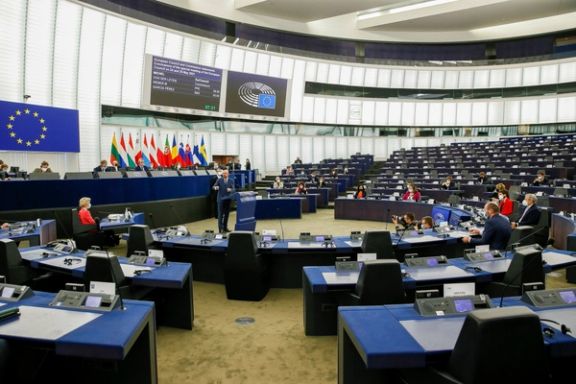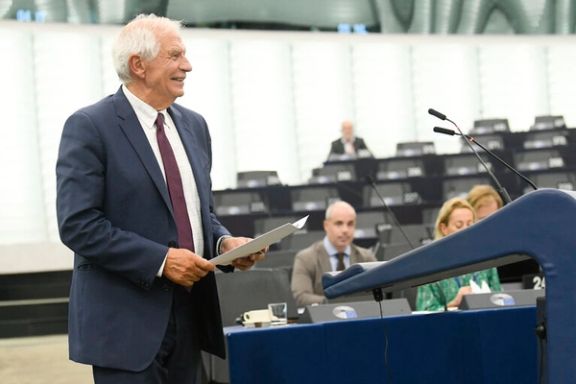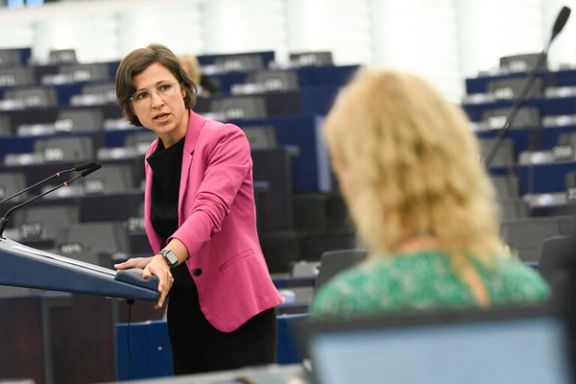European Parliament Gets Into Hot Debate Over Bloc’s Iran Policy

Members of the European Parliament Tuesday grilled EU’s foreign policy chief Josep Borrell over the bloc’s Iran policy as he tried to defend the trite strategies.

Members of the European Parliament Tuesday grilled EU’s foreign policy chief Josep Borrell over the bloc’s Iran policy as he tried to defend the trite strategies.
The plenary session opened in Strasbourg to discuss the effectiveness of European measures “one year after the murder of Mahsa Amini” in custody of the Islamic Republic’s hijab police that ignited the Women, Life, Freedom protests, the boldest revolt against the regime since its establishment in 1979.
Opening remarks by European Parliament President Roberta Metsola a day earlier sounded vapid as she reiterated that “Parliament proudly stands with the brave, defiant women and men who continue to fight for equality, dignity and freedom in Iran...” She also “strongly” condemned the Iranian regime for “taking EU and dual nationals hostage” and called for “the immediate release of EU official Johan Floderus and Professor Ahmad Reza Jalali.”
EU foreign policy chief Joseph Borrell opened similarly, claiming that "the EU has stood united over the past 12 months on Iran.” “The last 12 months marked a clear change in our relations with Iran. We've adopted nine consecutive rounds of sanctions...Our relations with Iran are at a low point, but we need to keep diplomatic channels open."

After Borrell, dozens of MEPs took turns decrying what they dubbed as toothless measures against the regime that failed to prevent killing of protesters, taking hostages, supplying arms to Russia and wreaking havoc across the region through the Revolutionary Guards as well as its proxy militias. Their demands included labeling the IRGC as a terrorist outfit, more comprehensive sanctions against the regime's human rights abusers, and refusing any negotiations with the regime until all EU citizens unjustly held are freed.
German MEP Hannah Neumann said, "Mr. Borrell, it's time to clearly spell it out: The EU's Iran policy of the last 44 years has failed. Stop meeting regime representatives! Start meeting the many different people that advocate for a free Iran! Stop financial flows of the regime and start exploring avenues for the diaspora to send home remittances for strike funds!”
“Spell out the truth: This regime terrorizes its own citizens and the whole region, it systematically uses rape to force political prisoners into confessions, and it is already preparing to crack down on the protests planned for September 16 (the death anniversary of Mahsa Amini). Mr. Borrell, you have to stop stabilizing a brutal regime while the people in Iran are prepared to die for its downfall!" she added.

Guy Verhofstadt, a former Belgian prime minister, denounced EU’s approach and strategy on the Islamic Republic, saying, “Let's be honest: the policy and the strategy of Europe towards Iran is purely symbolic. It has nothing to do with stopping the regime.”
“This parliament wants another approach! I request that in two months, we revisit this matter on the plenary of this parliament so that we can see the change in your strategy and that you can also convince your colleagues, the ministers of foreign affairs, because a new course of action is not solely your responsibility,” he added.
“What is happening in Iran is a disgrace. It's a regime of violence and murder,"Verhofstadt underlined.
Charlie Weimers, a Swedish conservative democrat, noted that “EU leaders have expressed support for the protests against the mullahs. But the EU has continued its failed policy of appeasement.”
He called on all the decision makers to “unite -- from left to right -- for a new EU policy: Maximum support for the people. Maximum pressure on the regime.”
Bart Groothuis, a Dutch MEP, called on the bloc to “expel all Iranian ambassadors from Europe” and cut diplomatic ties “until all European hostages are freed."
Borrell, the High Representative for Foreign Affairs and Security Policy, took the floor again after the MEPs, saying, “I don't think it is acceptable to say that the European Union supports this regime, which is what I just heard... You've expressed your moral indignation, and that's okay, but I don't think that that is actually going to solve miraculously the problems.”
"We've been working to help support Iranian women in their fight for their fundamental rights and will continue to do so. We are also working with the member states to try and solve many of the cases of European citizens that have been illegally detained in Iran. And we're trying to help and provide support for them to come back to Europe,” he stated.
Regarding calls for the designation of IRGC as a terrorist group, Borrell reiterated his earlier position that a national authority or court should find the IRGC complicit in terrorism before the EU takes a step to designate it.
Borrell claimed that "At the moment, we don't have that, and well, I can't take this step. We need the unanimity of the 27 member states and that is the basis. So, I'm afraid I can't do this. If you think that I'm wrong, tell me why."
His remarks came despite numerous efforts by MEPs and activists to provide the necessary groundwork for the EU to act on calls to list the IRGC as a terror group. In July, two MEPs stated that according to the “Common Position 2001/931/CFSP, Article 1(4) which sets out the parameters for the inclusion of persons and entities on the EU terrorist list,” the IRGC can be listed without any legal barriers. In June, a similar line of arguments was put forth by Iran’s exiled prince Reza Pahlavi, citing a group of French-Iranian lawyers who reasoned that there are no legal obstacles for the EU to blacklist the Revolutionary Guards.
In January, the European Parliament overwhelmingly passed a resolution calling on the EU and member states to designate the IRGC as a terrorist group, as it does not have such an authority. If the resolution garners enough support, it is then upon the national governments of the EU member states to make the final decision. The listing of the IRGC must have a unanimous vote by all 27 EU members in the EU Council.
Tweet unavailable